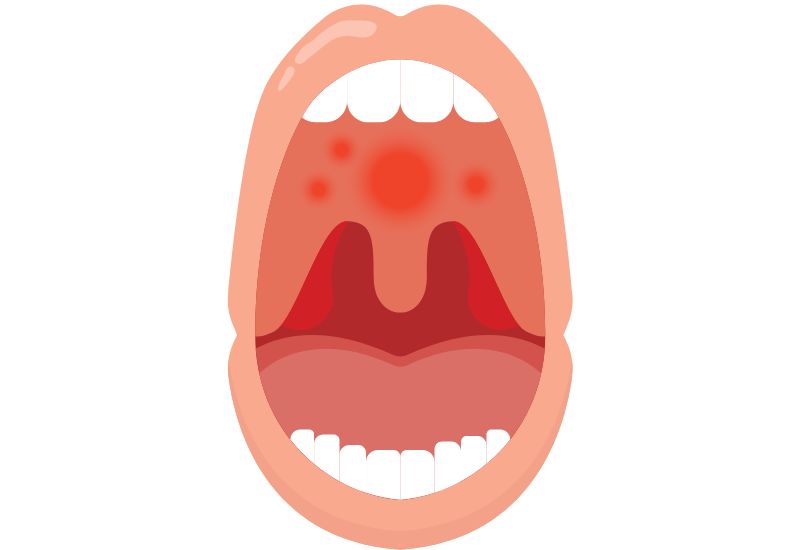Granular pharyngitis, a common form of chronic pharyngitis, affects approximately 36% of patients with sore throats. This persistent ENT condition often leads to prolonged discomfort, impacting quality of life. Below is a detailed guide on identifying symptoms and treatment options for granular pharyngitis.
1. What is Granular Pharyngitis?
Granular pharyngitis, a chronic type of sore throat, is distinguished by pink or red nodules along the back of the throat. These nodules form when lymphoid follicles—small immune structures that help combat infections—become enlarged as a response to long-term irritation and infection. Several factors may trigger this ongoing inflammation, including:
– Viral, bacterial, or fungal infections: Recurring infections put strain on throat tissues, leading to inflammation.
– Chronic sinusitis: Mucus drainage from the sinuses can irritate throat tissues, fostering an environment conducive to infection.
– Chronic tonsillitis: Similar to sinusitis, this recurring infection can cause mucus build-up in the throat.
– Gastroesophageal reflux disease (GERD): Stomach acid that reaches the throat can damage the lining, leading to chronic inflammation.
– Repeated acute pharyngitis episodes: Frequent sore throat episodes exacerbate irritation and can lead to granular pharyngitis.
– Structural abnormalities: Nasal polyps or a deviated septum may disrupt proper drainage and worsen throat irritation.
– Environmental factors: Working in polluted environments or using irritants like alcohol and tobacco can strain throat tissues.
– Weak immune system: Individuals with weakened immune systems may be more susceptible to chronic throat infections.

Chronic granular pharyngitis is characterized by pink or red nodules on the throat lining.
2. Recognizing Symptoms of Granular Pharyngitis
Identifying granular pharyngitis typically involves spotting specific symptoms:
– Presence of red or pink nodules in the throat that stand out from surrounding tissue
– Persistent dry or itchy throat, often worse in the mornings
– Pain or discomfort during swallowing
– Thick white or yellow mucus in the throat
– Hoarseness
– Swollen lymph nodes, accompanied by fever and headache (often over 100°F)
– Ear congestion due to Eustachian tube inflammation

Granular pharyngitis can cause persistent itching, irritation, and dryness in the throat.
3. Potential Complications of Granular Pharyngitis
While granular pharyngitis isn’t life-threatening, early treatment is essential to avoid complications, which may include:
– Respiratory infections such as chronic sinusitis, bronchitis, or even pneumonia
– Tonsillar or throat abscesses
– Complications like kidney inflammation, joint pain, or heart inflammation
– In rare cases, untreated chronic infections may increase the risk of throat cancer
4. Diagnosis and Treatment of Granular Pharyngitis
Individuals exhibiting symptoms of granular pharyngitis should seek medical evaluation. Diagnosis typically involves a physical examination and may include laryngoscopy or a chest X-ray to rule out other conditions. Treatment usually involves two approaches:
4.1 Treating Underlying Causes
If granular pharyngitis stems from other health conditions, treating the root cause is critical. This may involve:
– Managing acute pharyngitis, chronic tonsillitis, and chronic sinusitis: Addressing these conditions can reduce mucus accumulation and lymphoid follicle overactivity.
– Controlling GERD: Lifestyle changes and medications for acid reflux can prevent stomach acid from irritating throat tissue.
– Surgical interventions for structural abnormalities: Removing nasal polyps or correcting a deviated septum may alleviate chronic irritation.
4.2 Symptom Management
Medications are essential in alleviating the discomfort of granular pharyngitis. Doctors may prescribe:
– Cough suppressants and expectorants like Bromhexine or Dextromethorphan to ease throat irritation
– Pain relievers and fever reducers like acetaminophen (Tylenol) or ibuprofen (Advil) to manage discomfort
– Antibiotics such as penicillin or azithromycin for bacterial infections

To manage symptoms of granular pharyngitis, patients should follow their physician’s prescribed medications accurately.
For severe cases where enlarged lymphoid follicles are present, doctors may consider laser or cryotherapy to shrink the nodules. However, even with treatment, maintaining regular therapy to address underlying causes is essential for long-term relief.
In addition to medical treatments, individuals can also benefit from these lifestyle recommendations:
– Hydrate with warm fluids to soothe the throat and thin mucus
– Maintain a balanced diet and avoid spicy, acidic foods
– Avoid alcohol and tobacco to reduce throat irritation
– Gargle with warm salt water to cleanse and soothe throat tissues
– Use a humidifier to keep the air moist and minimize throat dryness
5. Preventive Measures for Granular Pharyngitis
To lower the risk of developing granular pharyngitis or its recurrence, consider the following:
– Treat related conditions like acute pharyngitis, chronic tonsillitis, sinusitis, and GERD promptly
– Practice good oral hygiene: Brush twice daily and use a saline mouthwash to minimize bacterial growth
– Avoid exposure to pollutants by keeping living and workspaces clean, and use a mask in dusty or chemical-heavy areas
– Limit alcohol and tobacco use
– Stay up-to-date with vaccinations to reduce the risk of respiratory infections
In summary, granular pharyngitis requires timely diagnosis and targeted treatment to alleviate symptoms and prevent complications. Adopting a proactive approach with preventive habits, symptom management, and treating underlying causes can significantly enhance quality of life for those affected by this common throat condition.








